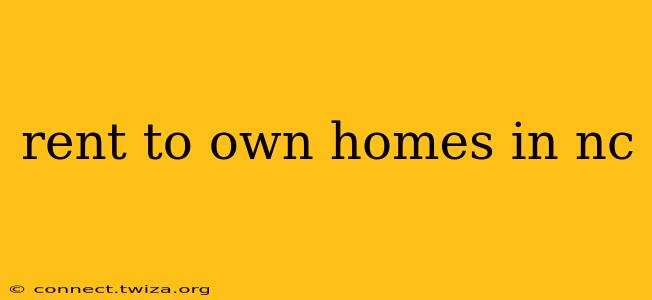Finding the perfect home can be a daunting task, especially when traditional financing options feel out of reach. Rent-to-own (RTO), also known as lease-purchase agreements, offers a potential pathway to homeownership for many North Carolinians. However, understanding the intricacies of RTO agreements is crucial before signing on the dotted line. This guide will explore the nuances of rent-to-own homes in NC, helping you navigate this unique real estate path.
What is Rent-to-Own in North Carolina?
A rent-to-own agreement in North Carolina is a contract where a tenant pays rent to a homeowner with the option to purchase the property at a predetermined price within a specific timeframe. This differs from a typical rental agreement because it includes a future purchase option. It's a complex legal agreement requiring careful review and understanding of all terms and conditions. The specifics of each agreement vary widely, so it’s essential to seek legal counsel before signing.
How Does Rent-to-Own Work in NC?
Typically, a rent-to-own arrangement involves several key components:
- Monthly Rent: You'll pay a monthly rent, which may be higher than a standard rental rate. A portion of this rent might be applied towards the eventual purchase price.
- Option Fee: You usually pay a non-refundable option fee to secure the right to purchase the property. This fee isn't applied towards the purchase price.
- Purchase Price: The final purchase price is agreed upon upfront and typically remains fixed throughout the lease period.
- Lease Term: The contract specifies the length of time you have to purchase the home.
- Conditions: The agreement will detail any conditions that must be met before you can exercise your option to buy (e.g., maintaining the property, securing financing).
What are the Pros and Cons of Rent-to-Own Homes in NC?
Pros:
- Path to Homeownership: It provides a way to buy a home even with challenges securing a traditional mortgage.
- Time to Improve Credit: It can give you time to improve your credit score, making you a more attractive candidate for a mortgage later.
- Opportunity to Inspect: You have the chance to live in the property and assess its condition before committing to a full purchase.
Cons:
- Higher Monthly Payments: Your monthly rent will likely be significantly higher than a standard rental.
- Non-refundable Option Fee: You'll lose your option fee if you can't purchase the home.
- Potential for Foreclosure: If you default on the lease agreement, you could lose the option fee and any money already paid toward the purchase price. Moreover, you could face eviction.
- Complex Legal Implications: Rent-to-own contracts can be complicated, requiring thorough legal review.
How to Find Rent-to-Own Homes in NC?
Finding suitable rent-to-own properties in North Carolina requires proactive searching. Options include:
- Working with a Real Estate Agent: A knowledgeable agent specializing in rent-to-own properties can guide you through the process and help you find suitable options.
- Online Listings: Websites specializing in real estate often have listings that indicate rent-to-own opportunities. Carefully examine each contract.
- Networking: Talk to friends, family, and neighbors; word-of-mouth can sometimes unearth hidden opportunities.
What are the Legal Aspects of Rent-to-Own Agreements in NC?
Rent-to-own agreements in NC are legally binding contracts. It's strongly advised that both the buyer and seller seek independent legal counsel before signing to understand their rights and responsibilities. The contract should clearly define all terms, including the purchase price, rent amount, option fee, lease term, and any conditions for purchasing. Failing to address these points can lead to future disputes.
Are there any risks associated with Rent-to-Own in North Carolina?
Yes, several risks are associated with rent-to-own agreements. These include:
- Unfair Terms: Some contracts may contain unfair or exploitative terms that favor the seller.
- Property Condition: You might discover significant property issues after moving in.
- Financial Instability: Unexpected expenses or financial difficulties can make it challenging to fulfill the purchase option.
- Lack of Financing: Securing financing to complete the purchase at the end of the lease term can be difficult.
How can I protect myself when entering a Rent-to-Own Agreement in NC?
To mitigate risks, consider:
- Thorough Due Diligence: Have a professional home inspector examine the property before signing.
- Legal Counsel: Consult with a lawyer to review the contract and ensure it's fair and protects your interests.
- Financial Planning: Ensure you can comfortably afford the monthly payments and the eventual purchase price.
- Pre-Approval for Financing: Seek pre-approval for a mortgage to understand your financing options.
This comprehensive guide provides a solid foundation for understanding rent-to-own homes in North Carolina. Remember, this is a complex process requiring careful planning, research, and professional advice. Always seek legal counsel before committing to any rent-to-own agreement.
